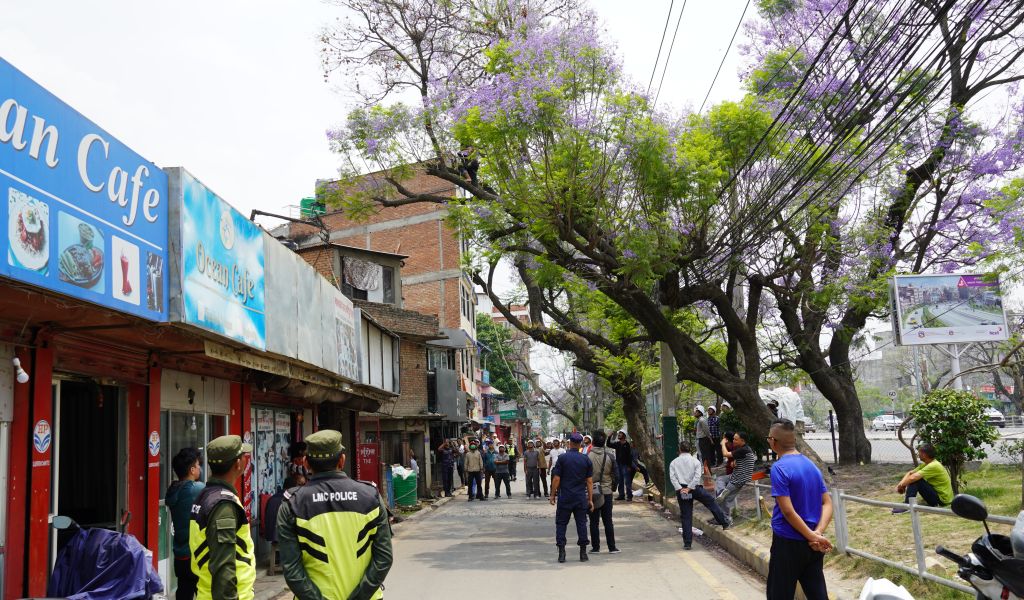Lalitpur's collaborative approach to balancing urban green spaces and public safety

Green spaces, including well-maintained trees and vegetation, are vital for creating beautiful, livable, and environmentally friendly cities. They offer numerous benefits for climate regulation, air quality improvement, physical and mental health, and overall quality of life. However, poorly managed, or neglected trees can pose risks to public safety and infrastructure, especially during adverse weather conditions like storms or high winds.
In recognition of these concerns, Lalitpur Metropolitan City recently collaborated with the Division Forest Office (DFO) and Nepal Police to launch an operation in the Mahalaxmisthan area. The primary objective of this joint effort was to mitigate potential risks posed by poorly managed trees and ensure community safety. By proactively addressing overgrown or hazardous trees, the city aims to strike a delicate balance between preserving green spaces and safeguarding public well-being.
The collaborative effort, led by Lalitpur Municipality, focused on identifying and removing hazardous trees marked by experts. Ten trees were selected for removal due to their potential to cause damage during adverse weather events.
Trained personnel from the Enhancing Livelihood from Improved Forest Management (EnLiFT) project, equipped with power chainsaws, executed the operation with minimal disruptions to the surrounding environment. As part of a capacity-building program, the Forest Research and Training Center, Bagmati Province, with technical support from the EnLiFT project, is training operators from community forest user groups across eight districts in the Bagmati Province. The objective is to ensure that trained operators are available within the province to respond promptly to emergencies, such as trees falling and blocking roads during disasters.
The significance of proper training in chainsaw operation and maintenance became evident during the operation. Durga Karki, Assistant Forest Officer at DFO Lalitpur, emphasized the importance of proactive urban tree management in protecting both people and the environment. Drawing from past experiences of disasters caused by falling trees during storms and heavy rainfall, Karki highlighted the necessity of learning from these incidents to implement effective management strategies.
An important observation during the operation was the vulnerability of Jacaranda trees (Jacaranda mimosifolia) due to their softwood nature. This underscores the importance of selecting tree species that are resilient to local weather conditions when planning urban landscapes.
Looking ahead, Lalitpur Municipality will plant new saplings in the spaces left by the removed trees, contributing to ongoing beautification and sustainability efforts in the area. This collaborative approach underscores the importance of continuous cooperation between municipalities, forest offices and local communities in managing urban landscapes and the upkeep of trees.
As urban areas continue to expand, prioritizing the maintenance and management of green spaces through initiatives like pruning, cleaning and weeding becomes increasingly crucial. Through proactive measures and collaborative partnerships, cities can create safer, more resilient and aesthetically pleasing environments for their residents.
##
The story/publication was produced as part of the Enhancing Livelihood from Improved Forest Management (EnLiFT) project in Nepal. The EnLIFT project receives financial support from the Government of Australia through the Australian Centre for International Agricultural Research.
RECOFTC Nepal, as a project implementation partner alongside Forest Action Nepal, aims to significantly contribute to scaling up Active and Equitable Forest Management (AEFM) and developing local capacity to ensure its continuity beyond the project’s lifespan. EnLiFT expands the geographical scope of AEFM practices through participatory engagement with a wider range of community forest user groups, promoting sustainable forest management and improved livelihoods across Nepal.
For more information about the EnLiFT project, please visit https://enliftnepal.org/
##
RECOFTC’s work is made possible with the support of the Swiss Agency for Development and Cooperation and the Government of Sweden.

